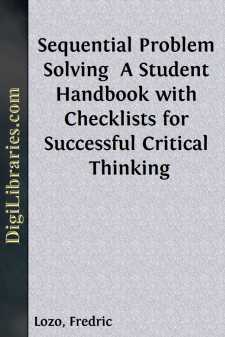Categories
- Antiques & Collectibles 13
- Architecture 36
- Art 48
- Bibles 22
- Biography & Autobiography 813
- Body, Mind & Spirit 141
- Business & Economics 28
- Children's Books 12
- Children's Fiction 9
- Computers 4
- Cooking 94
- Crafts & Hobbies 4
- Drama 346
- Education 46
- Family & Relationships 57
- Fiction 11826
- Games 19
- Gardening 17
- Health & Fitness 34
- History 1377
- House & Home 1
- Humor 147
- Juvenile Fiction 1873
- Juvenile Nonfiction 202
- Language Arts & Disciplines 88
- Law 16
- Literary Collections 686
- Literary Criticism 179
- Mathematics 13
- Medical 41
- Music 40
- Nature 179
- Non-Classifiable 1768
- Performing Arts 7
- Periodicals 1453
- Philosophy 64
- Photography 2
- Poetry 896
- Political Science 203
- Psychology 42
- Reference 154
- Religion 513
- Science 126
- Self-Help 83
- Social Science 81
- Sports & Recreation 34
- Study Aids 3
- Technology & Engineering 59
- Transportation 23
- Travel 463
- True Crime 29
Sequential Problem Solving A Student Handbook with Checklists for Successful Critical Thinking
by: Fredric Lozo
Categories:
Description:
Excerpt
INTRODUCTION
We are constantly trying to make some sense of our world and the way people treat each other. The purpose of this book is to provide a systematic way of analyzing situations and planning actions.
Sequential Problem Solving is written for those who want to reassure themselves that their thinking is logically correct rather than emotionally or impulsively misguided. It provides step by step procedures for applying computer-like decision making to daily living. Many ordinary problems involve not only physical, concrete parts but also interpersonal elements. Thus problem solving involves both the physical world and the interpersonal world. For instance, when solutions to physical problems are implemented, the job manager must decide which of several leadership-managerial styles is appropriate. Are the workers mature enough and knowledgeable enough to work together as a team without supervision, or are the workers so immature and unruly that an authoritarian task master leadership style will be required, or will the workers need a teacher-leader for some period of time before they become a team?
The underlying principle, throughout Sequential Problem Solving, is an obligation to help each other as citizens of a world community, and an acknowledgement that our real enemy is often ourselves. Our common problem is understanding ourselves in order to be a friend to others. Sequential Problem Solving provides us with a way of checking for the kindness factor in problem solving, with the goal of helping others and being a good citizen in the world community.
A separate section, Dealing with Unattached People, is devoted to the problem of neighbors in the world community who are untrustworthy for some period of time, from the view point that today's enemies are tomorrow's friends.
Some neighbors in the world community are, from time to time, untrustworthy. Since opportunities for misunderstanding are greater in a climate of mistrust, later sections are included that deal with mistrust and ways that we can gauge interpersonal situations and select an appropriate leadership style to match it.
Sequential Problem Solving begins with the mechanics of learning and the role of memorization in learning. The techniques of effective memorization follow, as well as other important learning skills.
This book contains many step by step checklists, much like pilots use to make certain that things of importance are not overlooked. These individual checklists are tied together in a broad flowchart that provides a sequential decision making pathway. The contents of the checklists are things that many adults utilize instinctively, without conscious thought. However these checklist can provide adults with a more positive way of checking their own thinking, in times of stress, and a way for students to become instinctive users of sound logic practices. Teachers may find that students instantaneously begin to act more mature because of the realization that their peers have a common body of knowledge about values and character traits and checklists to evaluate the behavior of others....


